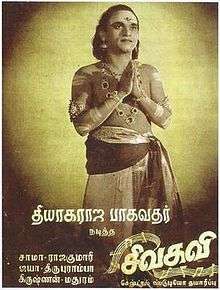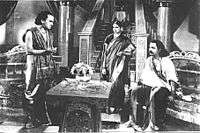Sivakavi
| Sivakavi | |
|---|---|
 Film poster | |
| Directed by | S. M. Sriramulu Naidu |
| Produced by |
Pakshiraja Films Central Studios |
| Written by | Elangovan |
| Screenplay by | Thiru Muruga Kirubanandha Variyar |
| Starring |
M. K. Thyagaraja Bhagavathar Serukulathur Sama Thripuramba S. Jayalakshmi T. R. Rajakumari N. S. Krishnan T. A. Madhuram |
| Music by | Papanasam Sivan |
| Cinematography | Adi Irani |
| Edited by | Surya |
Release date |
|
Running time | 212 minutes[1] |
| Language | Tamil |
Sivakavi was a 1943 Indian Tamil-language film directed, initially, by P. K. Raja Sandow and later, S. M. Sriramulu Naidu. It starred M. K. Thyagaraja Bhagavathar, S. Jayalakshmi, Serukulathur Sama, Thripuramba, T. R. Rajakumari, N. S. Krishnan and T. A. Madhuram. The film's screenplay was written by Thiru Muruga Kirubanandha Variyar. The film was shot at Central Studios and released by Pakshiraja Films in Coimbatore.
Cast
- M. K. Thyagaraja Bhagavathar as Ambalatharasan
- S. Jayalakshmi as Amrithavalli
- Serukulathur Sama as Cheenakar
- Thripuramba
- T. R. Rajakumari as Vanji
- N. S. Krishnan
- T. A. Madhuram
Production

Shooting was started in 1942 with P. K. Raja Sandow as the director. But soon afterwards, there were disputes between Raja Sandow and the producer S. M. Sriramulu Naidu.[2] With the progress of the filming, the disagreement between the two reached such high proportions that eventually, Sriramulu Naidu dismissed Raja Sandow and took over the reins himself.[2][3][1] The script for the film was written by Elangovan.[4]
T. R. Rajakumari, in one of her early roles, plays a court dancer or devadasi who falls in love with M. K. Thyagaraja Bhagavathar. S. Jayalakshmi who was married at that time played the character of Amrithavalli.[5] Her brother S. Rajam played the role of Lord Muruga.[6] Her father Sundaram Iyer played the role of a teacher of young Srikavi in sequences with N. S. Krishnan and others.[7]
Soundtrack
The soundtrack of the film consisted of 29 songs were composed by the music director Papanasam Sivan who also penned the lyrics for all songs while G. Ramanthan took care of orchestration.[2] Sivan originally penned the song Vadaname Chandra Bhimbamo as Mugam Adhu Chandra Bimbamo.[8] When M. K. Thyagaraja Bhagavathar pointed out to Sivan how "Mugam Adhu" sounded like "Muhammad", Sivan changed it to "Vadaname".[2][9] The song "Soppana Vazhvil" was based on Vijayanagari raga which resembles Sivaranjini raga.[10] The song "Amba Manam" is based on Pantuvarali raga.[11] The song "Vallalai Paadum" is based on Senchuruti raga.[12] The song "Vasantharuthu" is based on Vasantha raga.[13] The song "Kavalayai" is based on Natakurinji raga.[14] The song "Vadhaname" is based on Sindhubairavi raga.[15] The song "Ellam Sivan Seyal" is based on Thodi raga.[16] The song "Manam Kanidhe " is based on Rathipatipriya raga.[17]
The soundtrack was well received with the songs particularly "Soppana Vazhvil" and "Vadanamae" were well received. G. Dhananjayan said in his book Pride of Tamil Cinema that the songs contributed to the film's success.[9] According to film critic Randor Guy, the film is remembered for its scintillating songs mostly rendered by Thyagaraja Bhagavathar.[2] Singer Charulatha Mani wrote for The Hindu on the song "Vallalai" that, "M.K. Thyagaraja Bhagavathar’s voice is at its pliable best in this piece, and challenging sangatis flow unfettered, like liquid gold".[12] For the song "Vadhaname", she said "the complete octave is explored with splendid vocalisation in ‘...Madura Gaanamo…’, in lightning speed".[15]
Release
The film was a grand success and ran for a prolonged period even in non-Tamil speaking areas in the Madras Presidency.[2][3]
References
- 1 2 3 Dhananjayan 2014, p. 50.
- 1 2 3 4 5 6 "Sivakavi 1943". The Hindu. Retrieved 12 September 2015.
- 1 2 RANDOR GUY. "Baker-turned-filmmaker". The Hindu. Retrieved 12 September 2015.
- ↑ RANDOR GUY. "Wordsmith". The Hindu. Retrieved 12 September 2015.
- ↑ "Yesteryear actor dead". The Hindu. Retrieved 12 September 2015.
- ↑ "Artist’s brush with celluloid". The Hindu. Retrieved 12 September 2015.
- ↑ "Rajam's romance with cinema". The Hindu. Retrieved 12 September 2015.
- ↑ "Sound matters!". The Hindu. Retrieved 12 September 2015.
- 1 2 Dhananjayan 2014, p. 51.
- ↑ "Sivaranjani for pathos". The Hindu. Retrieved 12 September 2015.
- ↑ "Poignant Pantuvarali". The Hindu. Retrieved 12 September 2015.
- 1 2 CHARULATHA MANI. "Folksy flavours". The Hindu. Retrieved 12 September 2015.
- ↑ CHARULATHA MANI. "A Raga’s Journey — Hopeful, festive, vibrant Vasantha". The Hindu. Retrieved 12 September 2015.
- ↑ "Tones of grace". The Hindu: Mobile Edition. Retrieved 12 September 2015.
- 1 2 CHARULATHA MANI. "Light and melodious". The Hindu. Retrieved 12 September 2015.
- ↑ "Towering Thodi". The Hindu. Retrieved 12 September 2015.
- ↑ "The Priya principle". The Hindu. Retrieved 12 September 2015.
External links
- Guy, Randor (26 September 2008). "Sivakavi 1943". The Hindu:Cinema Plus. Retrieved 2008-10-13.
Bibliography
- Dhananjayan, G. (2014). Pride of Tamil Cinema: 1931 to 2013. Blue Ocean Publishers. ISBN 978-93-84301-05-7.